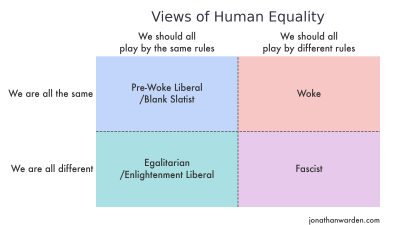What is Equality?
I often don’t know what people really mean when they talk about “equality”. Let alone “equity”.
People talk about “equality of opportunity” vs “equality of outcome”. I am not even sure what either of these means.
Equality of opportunity is impossible. The accidents of our birth influence the opportunities we will have in life, and the choices we make along the way will influence them further.
Equality of outcome is just as impossible. We are all different. And I don’t mean just individually. Groups are different. Men and women are different. Japanese and French people are different. City people and country people are different. This group-level differences will result in different group-level outcomes.
So we will have neither the same opportunities, nor the same outcomes.
Equality of Rules
But I still believe in equality. But not in equality of opportunity or equality of outcome. But in what sense?
In the sense that we should all play by the same rules. Nobody should be subject to discrimination based on any demographic attribute (sex, race, religion, etc). We should be equal before the law and society.
Two Dimensions of Equality
I think the different views of equality can be characterized as differences along two dimensions.
Empirical Equality
The first is the empirical dimension. In what we are we equal? Obviously, each individual is unique, so the question in what way are different demographic groups (e.g men and women) equal?
Obviously, there are differences in outcome (wealth, etc.). And obviously, different demographic groups have many superficial differences (they look differently, talk differently, etc). So the disagreement really is whether there are differences between groups in the fundamental potential to achieve any outcome, whether it be money, power, fame, or something else. If there is no difference in this fundamental potential, then any differences in outcome must be due to oppression or injustice of some sort.
Normative Equality
The second is the normative dimension. In what way we should we be equal? And there I think this most important distinction to be made is between those that think we should all be subject to the same rules, and those that different rules should apply to different groups.
Four Views of Equality
Viewed along these dimensions, we can explain four distinct views that people have about equality.
Empirical and Normative Equality
Before the rise of “woke”, there was a tendency on the political left towards endorsing empirical equality: attributing most differences in group outcomes to oppression and injustice. Steve Pinker called this view “Blank Slatism”. But this was only taken to the extreme by the most progressive. And the majority of liberals still held to the principle of normative equality for a long time.
Empirical Equality and Normative Inequality
The term “woke” was originally self-applied by a group of people who believed themselves to be particularly aware of the degree of oppression and injustice in society. And they believed that justice would require abandoning the principle of normative equality and actively discriminating against groups perceived as privileged in order to counter the cumulative effects of historical injustice. In other words, they believed in normative inequality despite empirical equality.
Empirical Inequality and Normative Equality
I believe most people still fall in this quadrant. They believe that cultural and even genetic differences are not all superficial: that men and women tend to want different things, that people from different cultures have different values, and that all these different contribute to different outcomes. And even though they may recognize the cumulative effect of historical justices, they don’t think these justify current discrimination. They believe in normative equality despite empirical inequality.
Empirical and Normative Inequality
This is where the fascists, white supremacists, etc. Like the woke, they believe in discrimination based on demographic factors like race and gender. But for very different reasons.
